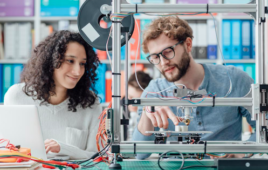 One of the constant threads we hear about in the manufacturing world is how much automation is taking over processes that were once manual in nature. That’s a good thing for motion control component manufacturers, as it means more business. And while some decry the potential loss of jobs, those jobs are often times unfulfilling, menial positions, and are supplanted by opportunities for more technical careers, such as with the recent growth in demand for factory workers with Mechanical Engineering Technology degrees.
One of the constant threads we hear about in the manufacturing world is how much automation is taking over processes that were once manual in nature. That’s a good thing for motion control component manufacturers, as it means more business. And while some decry the potential loss of jobs, those jobs are often times unfulfilling, menial positions, and are supplanted by opportunities for more technical careers, such as with the recent growth in demand for factory workers with Mechanical Engineering Technology degrees.
But there’s more to be gained here. In their book, Intelligent Automation — Welcome to the World of Hyperautomation, authors Pascal Bornet, Ian Barkin and Jochen Wirtz assert that intelligent automation (IA) deserves as much attention as artificial intelligence (AI) has been getting for years.
The authors lay out several key things that we need to get right as we move forward, and automation becomes a bigger part of our lives:
- We have to evolve our skills and adapt education to a world of IA. Job roles will need to be redesigned, and reskilling employees is imperative.
- Wage inequality will only increase with technology, and some sort of Universal Basic Income can be a way to solve this problem.
- We need to rethink work and focus on more fulfilling and meaningful occupations. A work-obsessed culture is an obstacle to creativity. A focus on thoughtful education, which can help people find their purpose in life, is key here.
The idea of a society freed from much of what we call work today is hard to fathom — and will require governments around the world to plan ahead (something they don’t always seem to excel at). Work isn’t going away, but will be different. Imagine explaining to a telephone or elevator operator in 1940 what some of today’s jobs are like.
The World Economic Forum predicted a few years ago that automation would displace 75 million jobs by 2022, but that it would also create 133 million new jobs in that same time period. Covid-19 surely recalibrated those numbers, but the net concept remains true. Jobs have changed over the centuries and if you think they won’t continue to do so in your lifetime, you haven’t been paying attention.
What’s sobering and different this time, the authors contend, is the pace at which change will happen. A survey of 352 AI experts by Yale and Oxford researchers predicts that AI will soon outperform humans at writing high-school essays (by 2026), driving a truck (by 2027), working in retail (by 2031), and writing a bestselling book (by 2049). These experts believe there is a 50% chance of AI outperforming humans at all tasks in 45 years. Maybe it’s time for us all to head back to school.
Filed Under: NEWS • PROFILES • EDITORIALS




